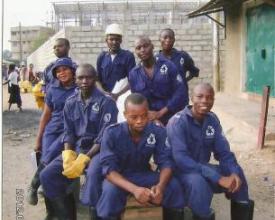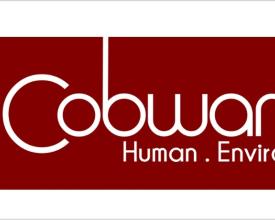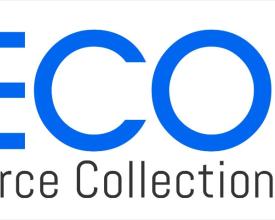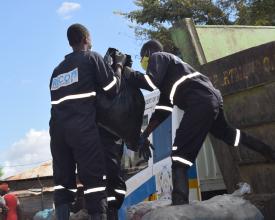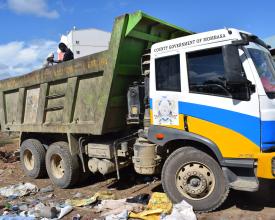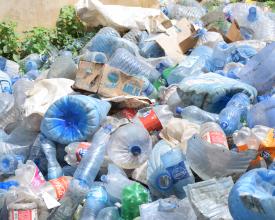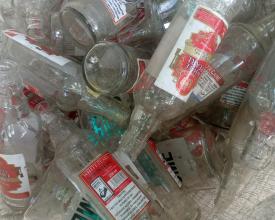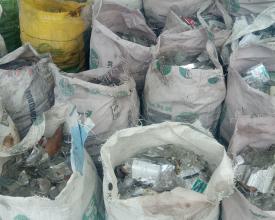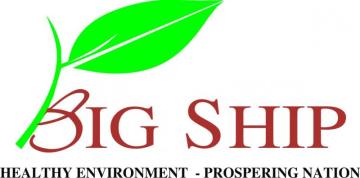
Community-based Waste Management Model (COBWAMM)
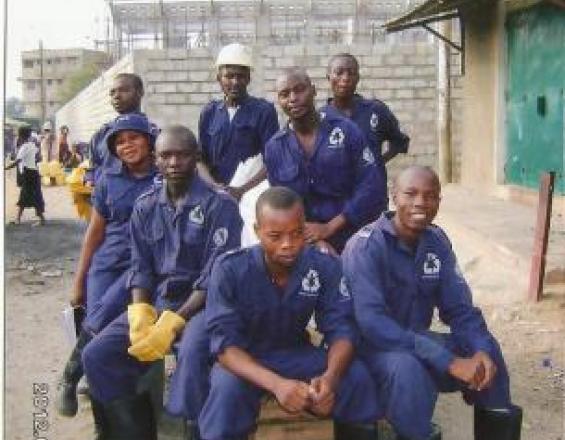
Community-based Waste Management Model (COBWAMM) is a youth-led social enterprise inspired by the Big Ship organization. Its mission is "To provide a reliable, affordable and efficient waste management service and derive value from resource-rich waste products in order to promote healthy communities and protect natural resources."
COBWAMM has two strategies:
- Resource Collection (RECO) - This is a franchise model that simplifies solid waste management operations for the urban poor, placing special emphasis on helping women and young people;
- Material Recovery Facility (MAREFA) - This is a model for deriving value from resource-rich waste in order to improve livelihoods.
With a view to increasing the rate of waste collection, particularly in low-income and densely populated neighbourhoods, efforts are taken to sort and generate revenue from materials at source.
Context
Challenges addressed
Challenges addressed
- Lack of adequate and affordable waste collection service
- Littering of the environment
- Lack of sorting at source culture
- Poor solid waste management practices in urban centres and densely populated neighbourhoods of Mombasa County
- Weak research and development (R&D) function limiting green innovation and entrepreneurship in the sector through innovative collection, recovery and divergence of waste.
- Poor waste disposal in the County and the resulting pressure on marine ecosystems including plastics and solid waste pollution in mangrove creeks
Location
Process
Summary of the process
Primary Collection
- Mapping of waste collection zones.
- GIS mapping conducted progressively to determine the waste collection zones that have the potential for the services.
Transfer / Transportation
- COBWAMM is engaging the National Environmental Management Authority (NEMA) to ensure that waste storage areas are carefully assessed and monitored to limit any environmental harm.
Sorting and Separating Waste
- The waste generators have the advantage of reducing the cost of waste collection services by sorting materials at the source.
- COBWAMM has established buy-back stations to buy recovered material from anyone willing to sell.
Building Blocks
Zoning of waste collection neighbourhoods
- Zoning of potential areas/neighbourhoods requiring waste collection services.
- Identification and recruitment of potential franchisee within priority zones.
- Conduct demand stimulations.
- Connect the franchisee with the zone for service provision by providing training, tools and equipment.
Enabling factors
- Provision of the brand to the franchisee.
- Provision of tools and equipment to the franchisee.
- Provision of training and awareness to the franchisee.
- Enhanced access to the market for the delivery of waste management services.
Lesson learned
- The concept of the franchise in its entirety is critical when setting up an innovation that involves the selling of franchise models.
- The ambiguity of the laws causes hindrances to many youths and women subscribing to service provision.
- The mindset of youths and women towards the provision of waste collection services creates a subscription barrier among them.
- Reliance on the county government to provide waste removal does not work.
Resources
Material Recovery Facility (MAREFA)
A Material Recovery Facility (MAREFA) is a space that receives, sorts, processes and stores recyclable materials to be shipped and marketed to end-users. MAREFA accepts materials, whether source separated or mixed, and segregates, processes and stores them for later use as raw materials for remanufacturing and reprocessing. The main function of the MAREFA is to maximize resource recovery while producing materials that will generate the highest possible revenues in the market. MAREFA will also function to process wastes into a feedstock for biological conversion or into a fuel source for the production of energy. MAREFA serves as an intermediate processing step between the collection of recyclable materials from waste generators and the sale of recyclable materials to markets for use in making new products. There are basically four components of MAREFA: sorting, processing, storage, and load-out. MAREFA is privately owned and operated by COBWAMM.
Enabling factors
- Increased human consumption and production as a result of lifestyle changes
- Increasing volume and variety of items to be recovered from the markets up the value chain in recycling and manufacturing.
- Increased demand versus supply of 'recoverables' to the job market
- Population growth as a result of rapid urbanization
Lesson learned
- Importance of understanding demand versus supply on the waste management value chain is important
- The effectiveness of the facility is dependant on the quality of human resources and handling tools inside the facility.
- Awareness of generators on the importance of sorting at source is critical.
- Plastic has adverse effects on the environment thus requiring recovery but it doesn't always make business sense (better to sort at source).
- Advice to anyone wishing to establish MAREFA: Let it be market-driven!
Effective Customer Services
Effective customer service is achieved through the development of an online payment system and customer service enabled mobile app (currently under development). These measures enable clients to interact with the service, submit applications, requests, and payments and even look for any upcoming value chain services.
Enabling factors
The existence of a mobile-based payment system and customer service app, enables the customers and other actors to interact with the service providers providing valuable feedback on the kinds of services they demand, hence increasing the effectiveness of service delivery.
The community we are serving is urban and trending towards high levels of smart phone ownership and internet access.
Lesson learned
Service delivery through mobile-based applications enables information to be passed easily to users. This has helped increase community awareness of proper waste management practices.
The majority of the community we intend to serve are conversant with the mobile-based payment system in Kenya and thus, the mobile-based text (USSD) has helped facilitate the services where smartphones could not reach.
Some youths and women we target to subscribe to the franchise model of the waste collection are technologically shy and require encouragement.
Legal Framework on Waste Governance
The project references and aligns with the relevant legal framework making it easier to influence and persuade current and prospective clients. The existence of a County legal framework on waste governance is critical for the success of the project.
The National Solid Waste Management Strategy spells out national targets on waste management and is also important for the project.
Enabling factors
Existence of a waste governance structure that includes the National Solid Waste Management Strategy and the National Sustainable Waste Management Bill, 2019. They are important enablers of the implementation of waste management project by helping regularise and organize all actors within the waste value chain.
Lesson learned
The role of government in waste management is critical and manifests through policies and bills which have proven to be the blue print and reference point for actors in the sector.
There is, however, the challenge of policy overlaps which can result in hefty charges and taxes within the waste sector.
Impacts
- Facilited effective residential waste collection especially in low-income and populated neighbourhoods.
- Provided innovative training on entrepreneurship, including how to start and run social enterprises.
- Developed networks of both private and public waste actors.
- Improved state of the environment, employment opportunities and higher living standards for the urban poor including youths, women and people with disabilities.
Beneficiaries
- 1.3 million residents of Mombasa County through the provision of a cleaner healthier environment
- Youths and women guaranteed sustainable livelihoods
- County Government of Mombasa
- Waste pickers, informal and formal garbage collectors within the sector
Sustainable Development Goals
Story
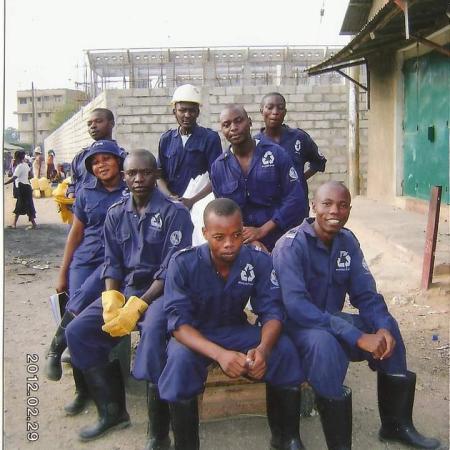
It's 2009. My priority is to survive and serve my community. As a young and energetic person straight out of high school, I couldn't find a better thing to do than help save my community from drowning in illegal waste while combatting high levels of unemployment. Together with like-minded youths, I decided to give it a shot and soon found myself as a director of a community-based organization. Our story has not only inspired more youths to follow in our footsteps but has provided key partners with a mirror to reflect on what could become of people like us when given the opportunity in a conducive environment to exercise our talents, skills and knowledge in an ever-challenging world. Today I am not only a director but I have managed to give back to my community by facilitating the development of social enterprises that provide solutions to real problems in real-time.

